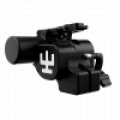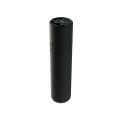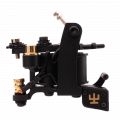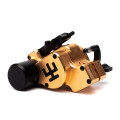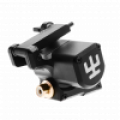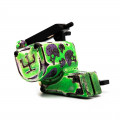How to choose a pneumatic tattoo machine?

Choosing the right pneumatic tattoo machine can be an overwhelming task, especially given the wide variety of options available today. Unlike traditional machines, pneumatic models use compressed air, offering a unique tattooing experience that many artists find advantageous. This comprehensive guide will walk you through the essential factors to consider when choosing a pneumatic tattoo machine, as well as the advantages and disadvantages of these machines. Whether you are an experienced professional or a beginner, understanding how to select the right pneumatic tattoo machine is crucial for achieving precision and comfort in your work.
Contents- What Are Pneumatic Tattoo Machines?
- Key Differences Between Pneumatic and Traditional Tattoo Machines
- Disadvantages of Pneumatic Tattoo Machines
- How to Choose the Right Pneumatic Tattoo Machine
- Leading Brands and Models of Pneumatic Tattoo Machines
- Maintenance of Pneumatic Tattoo Machines
- Conclusion
What Are Pneumatic Tattoo Machines?
Pneumatic tattoo machines are an innovative type of tattooing equipment that operates using compressed air, as opposed to electric motors. This technology, first introduced by tattoo artist Carson Hill in 2000, has gained significant attention in professional studios due to its unique advantages in terms of precision, comfort, and sterilization.
In pneumatic machines, a small air compressor controlled by a foot pedal powers a piston within the machine's handle. This piston causes the needle to move up and down at high frequencies, enabling the artist to maintain precise control over the needle's speed and depth. The result is smoother, more consistent ink application that can elevate the quality of your work.
A standout feature of pneumatic tattoo machines is their autoclavability. Unlike traditional machines, which may require complex disassembly for sterilization, pneumatic machines can be completely sterilized in an autoclave. This simplifies the cleaning process and ensures a high standard of hygiene, making them ideal for artists who prioritize cleanliness and ease of maintenance.
Key Differences Between Pneumatic and Traditional Tattoo Machines
Pneumatic tattoo machines differentiate themselves from traditional machines in various aspects, including their power source, mechanism, and overall user experience. Below are some key differences:
- Power Source and Mechanism: Pneumatic tattoo machines use compressed air to drive the needle, unlike electric-powered traditional machines.
- Noise and Vibration: Pneumatic machines are significantly quieter and produce less vibration.
- Weight and Portability: They are lighter, reducing hand fatigue and increasing maneuverability.
- Sterilization and Hygiene: Being fully autoclavable, they are easier to sterilize and maintain hygiene standards.
Disadvantages of Pneumatic Tattoo Machines
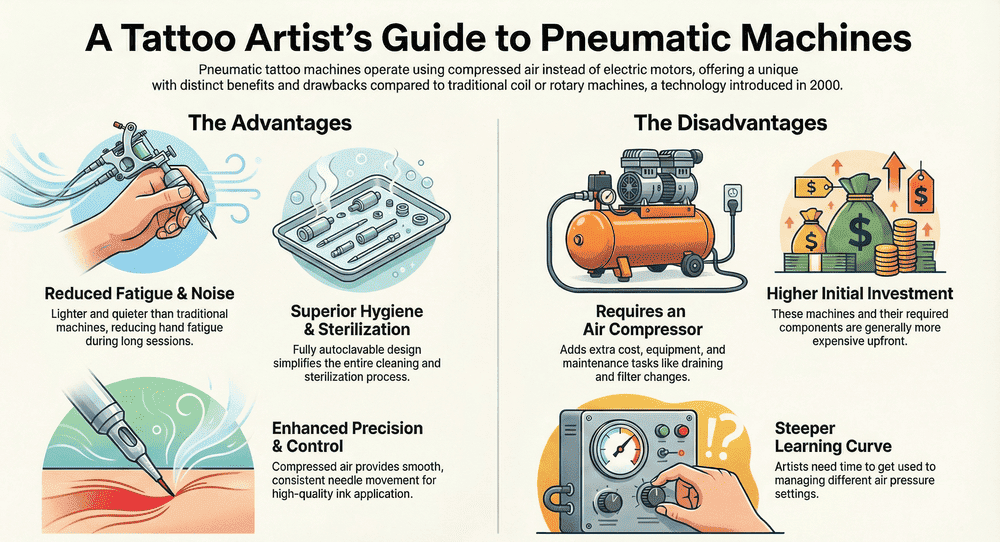
While pneumatic tattoo machines offer numerous benefits, they also come with certain drawbacks that should be considered:
- Requires an Air Compressor: Adds extra cost and equipment.
- Higher Initial Investment: These machines are generally more expensive.
- Limited Availability: Not as commonly available as coil or rotary machines.
- Learning Curve: Requires some getting used to, especially regarding air pressure settings.
- Compressor Maintenance: Needs regular draining and filter replacement.
How to Choose the Right Pneumatic Tattoo Machine
Selecting the right pneumatic tattoo machine is crucial to ensuring comfort and precision. Here are key factors to consider:
- Understand Your Style: Choose based on the kind of tattooing you do—lining, shading, or color packing.
- Ergonomics: Pick a design that’s comfortable for long sessions.
- Weight: Lighter machines reduce fatigue.
- Adjustability: Check stroke length and needle depth settings.
- Compressor Compatibility: Ensure the machine works with standard compressors.
- Autoclavability: Look for models that can be fully sterilized.
Taking these into account helps ensure a better, more efficient experience.
Leading Brands and Models of Pneumatic Tattoo Machines
Several brands have established themselves as leaders in the pneumatic tattoo machine market, offering innovative designs and advanced technology. Below are some of the top brands and their standout models:
- Vlad Blad Irons: Known for their reliability and ergonomic design.
Popular Models: Custom Avenger 3 Pro, Avenger 2 Pro Series, Avenger 3 Pro Series.
- FK Irons: Popular for the Flux series, with wireless compatibility and ergonomic grip.
- Cheyenne: Hawk series (Hawk Pen, Hawk Spirit) are quiet and adjustable, ideal for pros.
- Dragonhawk: Affordable options like the Mast Pen with ergonomic design.
- Stigma-Rotary: Known for versatile and easy-to-use models like the Stigma Pen.
- Inkjecta: Flite Nano series features customizable stroke and high precision.
- Hawke Tattoo: The Hawke Pro series offers minimal vibration and lightweight bodies.
- Eikon Device: Features advanced 3D pneumatic machines with ergonomic handling.
Maintenance of Pneumatic Tattoo Machines
Proper maintenance ensures long-term performance and hygiene. Follow these practices:
- Routine Cleaning: Wipe the machine after each session and sterilize it in an autoclave.
- Inspect Components: Check O-rings, pistons, and seals regularly.
- Air Compressor Maintenance: Drain moisture and replace filters on schedule.
- Storage: Store in a dry, dust-free environment.
- Follow Manufacturer Guidelines: Always refer to your machine’s manual for specific care instructions.
Conclusion
Pneumatic tattoo machines offer excellent performance, cleanliness, and comfort. By choosing the right model and maintaining it properly, you’ll enhance your tattooing workflow and deliver better results for your clients.

